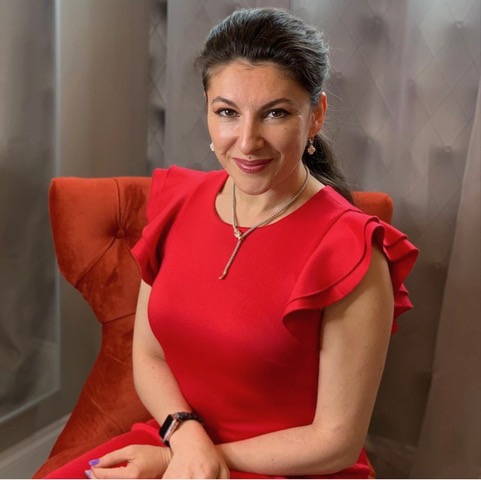Dr. Angelina Postoev, MD., FACS, (Fellow of the American College of Surgeons). Lovingly known as “Dr. Angelina,” she has dedicated her life to connecting, educating, and improving the quality of patients’ lives with the best treatments for their overall health. Her singular focus on this mission has earned her much acclaim, countless honors, Five-star ratings, “10” designations, and glowing comments from various platforms. In addition, patients rave about how “comfortable” she makes them feel and swoon about the excellent care they receive.
She is triple board-certified by the American Board of Surgery and the American Academy of Cosmetic Surgery. Additionally, she is triple-trained and licensed in Cosmetic, General Surgery, and Critical Care Surgery. She is also an Augusta University Professor of Surgery and Assistant Professor of Surgery at GRU-UGA. This is only a sampling of the accolades, Fellowships, and distinguished memberships that highlight her formidable career.
Dr. Angelina is among medical practitioners who assert that obesity is a medical condition. She has dedicated her life to spreading the message about maintaining a healthy weight that will combat fertility, diabetes, high blood pressure, and other premorbid illness.
In this give-and-take with N’DIGO, Dr. Angelina provides insight into her ascension and the growth of her healthcare centers. She denounces impulsive weight-loss schemes and dismisses diets in favor of a sustainable healthy lifestyle.
Her specialties are abdominoplasty, breast augmentation, reduction, mastopexy, liposuction, buttock enhancement with fat transfer, face and neck lift, blepharoplasty, etc. However, market research and demographics indicate that N’DIGO’s readers have a keen interest in health, wellness, and weight loss. This Q&A will, therefore, center around the concerns and issues that impact N’DIGO devotees.
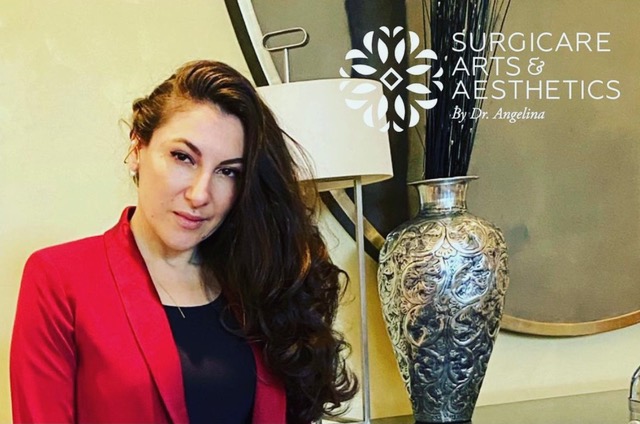
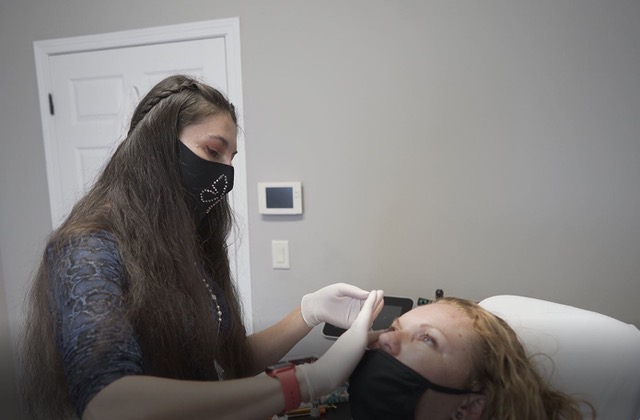
How did you get interested in the face, body cosmetic surgery, and weight loss?
It’s all related. When we first started weight loss surgery in 2012, it became clear that the client wanted all of their body to reflect that change when they began losing weight. So aligning with that is body surgery. So that’s why all services we provide are related.
What inspired you to move and open the first of your centers in rural Georgia?
The family moved to a small town in Georgia right outside of Atlanta and started our centers from scratch. We were motivated by the lack of good healthcare in the area and within a 20-mile radius. We were trying to bring care to those who need and deserve care. We wanted to help people who don’t get regular attention — especially the Latino, African-American and immigrant populations. We discovered that 40% of Georgians and in surrounding states are obese. Note I didn’t say they are overweight. I said OBESE. So, we concentrated our talents on weight loss surgery. There’s a payoff because their high blood pressure is gone after they lose the weight.
I started my non-profit to create a vehicle where people can get the funding for their care, but because of the pandemic, it hasn’t really gotten off the ground.
I understand there is a four-letter word that you don’t like. That word is DIET. Why?
I don’t do diets. Weight loss has to be a sustainable lifestyle change. I’m not against diet and exercise, but they don’t work for weight loss. People resort to many things to lose weight. They starve. They wake up at 5 AM, run a mile, do crazy workouts, and crash diets. The Biggest Loser show was a good concept and based on a boot camp/crash diet/crazy exercising regime. But once you stop, the weight comes back — plus extra. It must be a sustainable lifestyle change, which is the key to successful weight loss.
It appears that of the bariatric weight-loss options you have, the most popular and the most flexible is the gastric balloon or Orbera balloon. It seems like a great option since it doesn’t require surgery. Explain what it is, how it works, and its benefits. And why is it for those who may not be “all in” but still want a trial run to determine if they can go the distance?
It’s a gastric balloon, also known as an intragastric balloon or a stomach balloon. It is an inflatable medical device that is temporarily placed into the stomach. It is designed to help provide weight loss when diet and exercise have failed, and surgery is not wanted nor recommended. It stays in for six months, which is a trial run. We get those people who need to lose 35-50 pounds and give them six months to learn. That includes how much water you have to drink, how small your meals have to be, and how to fast.
The balloon requires eating smaller meals, and it reinforces proper portion control. It is removed after six months.
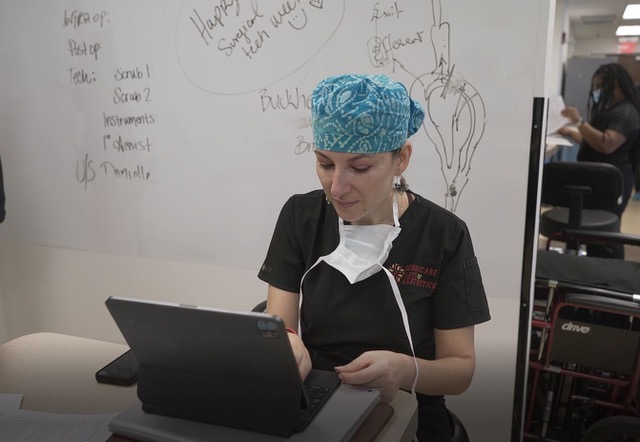
Before beginning this journey, how do you prepare a patient? It appears to be daunting. In fact, how do you vet applicants to make sure they have the discipline and fortitude to go the distance and won’t backslide. Pace me through a first consultation.
The balloon is not for everybody, so it takes a few visits to get them ready. We want them to go the distance. So as part of the first consultation, my staff talks to each patient individually. We get them ready.
And what are the typical questions prospects ask at their first meeting, whether they get the balloon or have surgery?
Will I get healthier? Will surgery help me? Will I like the way I look?
They are all trying to get healthier. By the time they get to me, they are ready to make that process happen.
Are there differences in what your Black clients ask versus the White ones?
They ask the same general questions.
Yes. But there are areas where Blacks and Whites are different. For example, Black women’s bodies are different from White women’s bodies. Is your weight-loss approach to treating Black women different?
There’s big and beautiful, and there’s big and healthy. There’s a line that you cross over. But there are differences. Determining weight loss benchmarks is not always based on BMI. You can’t compare the BMI of a little white girl with a Black girl. Your BMI is what’s healthy for you. There’s a clear difference between the white population and the Black population. A Black woman at140 pounds may not look great, but, at 180 pounds, she looks great. African-American women like their curves. I just want them to be healthier with curves.

And what are the indicators that a prospect would not go the distance or isn’t ready for the balloon?
If someone says they’ve never exercised or dieted and plan to pig out the night before the balloon is placed, they are not in the right state of mind for the procedure. If you pig out after the balloon is placed, you will get sick. Period.
OK. What happens during the six-month period when the balloon is inserted?
During the six months, there is a dietitian to monitor their eating. We follow up even if things are going great. There is a weigh-in. And depending upon their progress, we’ll either praise them for a good job or, if things aren’t going well, we’ll give them a gentle kick in the butt. They check in every quarter to monitor blood levels. If necessary, we will adjust pills and determine if there may be a new medicine to support weight loss. They engage in monthly support groups via Facebook and Zoom. Under the right conditions, things will change. We encourage them to eat right and drink water. They will feel full. We try to get them to complete the six months. After six months, we remove it.
So, once the balloon is removed, what next?
Having the balloon removed is not a one-and-done proposition. First, you must transition to a healthier lifestyle. And the earlier you get it, the better. Contrast the condition of a 20-year-old versus a 50-year old. The 20-year old is more likely to get rid of diabetes than the 50-year-old.
So, after the six months and the balloon is removed, begin intermittent fasting where you’re eating eight hours in the day and not eating 16 hours or more. Or do a weekend fast or a 48-hour fast. It will vary from day to day or person to person. The idea is having 16 hours when you’re not taking in calories. It would be best to drink plenty of water during that time. Eat naturally. And when you eat, take in smaller portions.
I view that as a FOREVER proposition.
Yes. You must incorporate healthy eating and a healthy lifestyle – FOREVER!
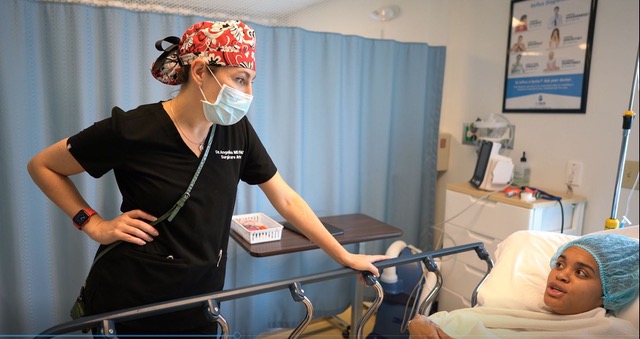
Outside of your team’s excellent counseling, treatment, and resolve to help the patient negotiate the journey successfully, what are the major reasons the balloon recipients succeed?
Supporting someone throughout the journey and afterward is critical. Unfortunately, support is lacking for a lot of people. It would help if you educated family members to be supportive without shaming them. This is especially true among African-American families. If family is not part of the support system, we can recommend a group comprised of others who have been there. Another option is to seek out a faith-filled group or a Facebook group. But, whatever you do, find a support network after you’ve had the procedure because that is vital to weight-loss success.
How are candidates for these procedures determined?
Candidates for the mini gastric pass are usually determined on a case-by-case basis. But generally, patients have a BMI of over 35 and also suffer from some obesity-related diseases such as type 2 diabetes or high blood pressure.
Those are two options. But there are different versions and variations of gastric bypass out there. So we decide which one is appropriate to the patient and their needs based on medical consultation with a doctor.
How do you prepare patients for the surgery?
We assess their health, review their medical history and determine their Body Mass Index (BMI). We see where they are currently. We set up weight loss visits, gauge their progress, address the root cause of the weight gain, and provide a tailored treatment plan. They start making a few changes, and then we get them in the right mindset and get them ready for surgery, even if it takes two weeks. But it doesn’t require much to get them prepared and ready for surgery.
Would you refuse them if someone comes to you and is morbidly obese, like 600+ pounds?
No one is refused. There are a lot of options to take into consideration, including health and safety. We give them medications if they are too unhealthy for surgery and then give them medicine so they can get the procedure. We tailor a plan for each individual and determine the best choice whether it’s the gastric sleeve, gastric bypass if they are too big or any other options in between.
OK. Now that the surgery is over and/or the balloon is removed, is there any leeway in eating habits? What about cheat days?
I don’t like cheat days. That’s why diets don’t work… because of cheat days.
Weight loss is beneficial to ward off a broad spectrum of diseases and conditions. But, when you lose weight, the skin becomes saggy…loose. How do you address that?
Yes, there is a problem of saggy skin, especially around the belly. After the surgery, they don’t feel comfortable in their skin and they don’t want to undress because the skin is so saggy. Here they’ve gone through this major transformation and then they have another problem with saggy skin. We have to keep taking care of people after they lose the weight. Yes., the high blood pressure is gone but you don’t feel comfortable in your skin. To address this, I went to another fellowship to help rid the body of that sagging skin. That requires a surgical body lift where the skin is removed.
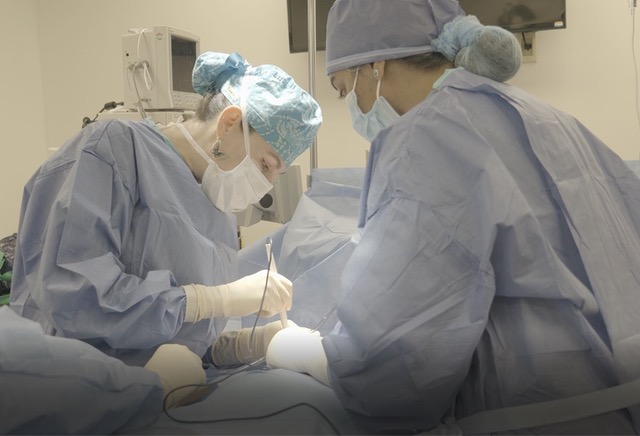
I saw somewhere that you consider yourself an artist and a surgeon. Please elaborate.
No one template fits all. You have to work with each person and their body image. You can’t make everybody look the same. You have to be part artists and work with the body in front of you. At the same time, you try not to overdo it. It’s an art form.
You have assembled a staff that embraces every discipline and support network that the patient would need. Tell me about the size of your team, their disciplines, and how they align with your mission.
My overall staff consists of eight doctors: Five weight loss/bariatric surgeons. We also have plastic surgeons and a dietitian. Part of the staff works on weight loss surgery and afterward. And part does cosmetic surgery. We also refer to our network of doctors that we work with. We work as a team.
Dr. Angelina, you have garnered such a stellar and far-reaching reputation that it attracts those who fly in for the weekend for the balloon procedure or for any of the services. How does that work?
We have national and international patients who fly in from other states and other countries, and we make it convenient. They usually come for the weekend to have the procedure. Before flying in, we do a telemedicine consult, which is by FaceTime-like software. We ensure they get all of their clearances and pre-op before flying in. We have an office in Buckhead, which is closer to the airport. They undergo the procedure as an outpatient. They stay in a nearby hotel during the post-operative phase. We provide extra IV fluids and vitamins. We keep them hydrated. People feel great and can fly back. When they return home, we find a location where they can go for follow-ups. At the same time, we engage in phone conferences, and then we do our follow-up via telemedicine.
You preside over several centers in two different states. And your far-reaching reputation, commitment to quality healthcare, and the stellar results have earned you a flourishing and dedicated clientele base that has a national — even international — reach. You seem to handle all of this so effortlessly.
(Laughs incredulously) Effortlessly? I wouldn’t call it effortlessly. We have a good group of people on the staff who believe in our mission and our goals. People see and feel it and come back and rely on us for other services. We create a relationship where you can ask your doctor simple questions. Email. Text them. It is important to be comfortable with the staff.

In all of your literature – on your website and on other platforms — you’re in high heels, a trendy outfit and you strike a confident presence. And yet, you were raised in Russia during your impressionable early teen years. When I think of Russia, I think of cold weather, Siberia – babushkas – the Kremlin – PUTIN! But you’re totally glam, so far from your Russian roots. How did you make such a transformation?
There is a huge misconception about Russia as the US considers Russia a rural area. Moscow is one of the most metropolitan and cosmopolitan cities for glamour, fashion, glam, art, history and culture. The women are often overdressed for the occasion.
Thanks. I stand enlightened. And your style?
I’ve always loved fashion, high heels, keeping up with the latest trends and everything associated with that. My style reflects that.
When you’re not overseeing your successful operation, how do you relax?
I love reading but nothing too dramatic because I get enough of that in surgery. I like comedy. It’s something to get my mind off the work. Fun stuff. Nothing too sad or scary.
Traveling? What’s your favorite destination?
I fly everywhere but I love South America – especially Ecuador.
There are a lot of men and women from Chicago who would make great candidates for any of the weight-loss options you offer. But what if they’d prefer to have the procedure done in their hometown rather than fly in for a weekend run. Any chance of you opening a center in Chicago?
I am looking for areas where I can expand. But, not Chicago. No. It’s too cold.
I understand that I have lived here all my life and suffered through many sub-zero winters.
One more question. What about your legacy? You and your husband have children. Do any of them seem to be leaning toward taking over the business one day?
The oldest is going to college soon but doesn’t seem to have any interest. The little ones – six years and nine years old – are too young. But they understand the importance of what I do by how they describe my work.
They say, “Mamma does good things. She’s helping people!”
Out of the mouths of babes. That beautifully captures the essence of what you do. I can’t think of a better way to end this, than with their words.
Thank you, Dr. Angelina.
 Melody M. McDowell is a seasoned writer and veteran publicist. She is a freelance writer. Her public relations firm, MELODY’service has been in business for 40 years. She once served as the personal publicist for Dr. Mae Jemison, the first woman of color to launch into space.
Melody M. McDowell is a seasoned writer and veteran publicist. She is a freelance writer. Her public relations firm, MELODY’service has been in business for 40 years. She once served as the personal publicist for Dr. Mae Jemison, the first woman of color to launch into space.
Melody is a proud member of Alpha Kappa Alpha Sorority and served as its publicist for eight years, including in 2008, its Centennial year. Melody lives in Markham, Illinois — a city she has grown to love after transplanting from Chicago. Melody also loves cats.

